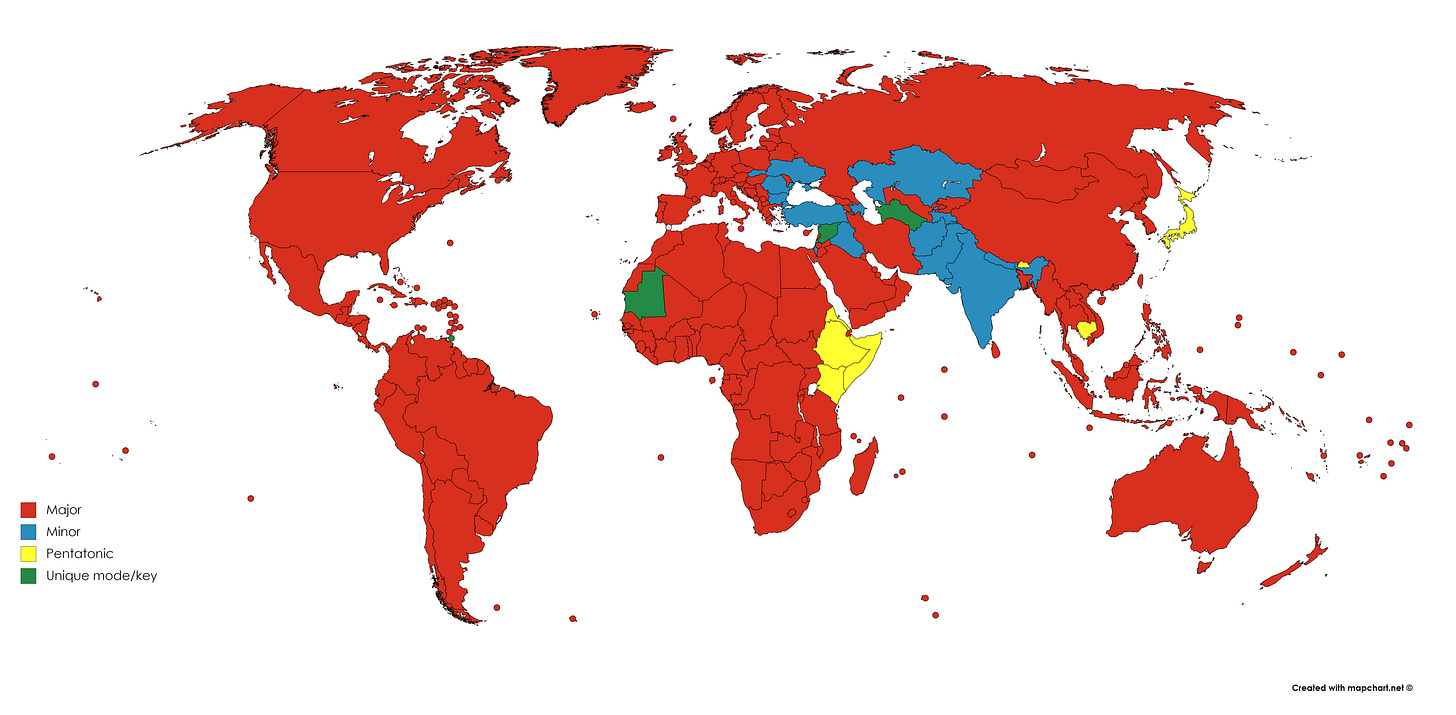It is a part of the Staatsräson of Germany that Israel exists, and that its continued existence should be defended by Germany. So said Angela Merkel, the Chancellor, in 2008. When she visited Israel.
The statement didn’t come unprovoked, just like that, but Willy Brandt had fallen to his knees in contrition (at the six million Jews Germany had eliminated) when he was in Warsaw, and he was a socialist, so Merkel needed to up the ante on that. The defence of Israel’s right to exist is a part of the very reason for which Germany exists. So, it must be in their national anthem, I guess. Let’s take a look.
Einigkeit und Recht und Freiheit
für das deutsche Vaterland!
Danach lasst uns alle streben
brüderlich mit Herz und Hand!
Einigkeit und Recht und Freiheit
sind des Glückes Unterpfand:
|: Blüh’ im Glanze dieses Glückes,
blühe, deutsches Vaterland! :|Unity, and justice and freedom
for the German fatherland!
Let us all strive for that
in brotherhood, with heart and hand!
Unity and justice and freedom
are guarantors of happiness:
|: Flourish in the radiance of this happiness,
Flourish, German fatherland! :|
No, not too much about Israel in there. There is quite a good bit about Germany, but that is something you would expect in a German national anthem. Now, prior to the Second World War, it is another verse of von Fallersleben’s poem that served as the German national anthem, but Israel did not exist at that time, so it can hardly have been expected to refer to Israel.
But, even if it was only legally adopted in 2004, the Israeli national anthem has been referring to Israel since 1933, 15 years before Israel was founded, when it was adopted as the anthem of the International Zionist movement. It is called the Hatikvah, and here is the text:
As long as in the heart, within,
The Jewish soul yearns,
And towards the ends of the east,
[The Jewish] eye gazes toward Zion,
Our hope is not yet lost,
The hope of two thousand years,
𝄆 To be a free nation in our own land,
The land of Zion and Jerusalem. 𝄇
In case I got that wrong, here is the original:
כֹּל עוֹד בַּלֵּבָב פְּנִימָה
נֶפֶשׁ יְהוּדִי הוֹמִיָּה,
וּלְפַאֲתֵי מִזְרָח קָדִימָה,
עַיִן לְצִיּוֹן צוֹפִיָּה;
עוֹד לֹא אָבְדָה תִקְוָתֵנוּ,
הַתִּקְוָה בַּת שְׁנוֹת אַלְפַּיִם,
𝄇 לִהְיוֹת עַם חָפְשִׁי בְּאַרְצֵנוּ,
אֶרֶץ צִיּוֹן וִירוּשָׁלַיִם.𝄆
The German Staatsräson and the Israeli Staatsräson are therefore (just like voting in the Eurovision Song Contest) identical, and not reciprocal. Germany will defend Israel, even if the basis for that statement is a speech by an erstwhile chancellor, rather than Germany’s constitution but I’m not sure in how far Israel would come to the rescue if Germany were endangered. Even Konrad Adenauer’s recognition of the right of Israel to exist does not go as far as Merkel’s enunciation of Germany’s reason for being, of which she said the defence of Israel is a part. Olaf Scholz, who was Germany’s last chancellor before the present one, restated Merkel’s declaration in even stronger terms: not that Israel’s defence is part of Germany’s raison d’être, but that it is Germany’s raison d’être, Punkt aus.
Yet not one word of that reason for being is set forth, either in the German constitution (Grundgesetz) or in its national hymn (Nationalhymne), which is by definition an expression by the German people of what is important to them. And what is perhaps most important to any German, in the present state of the world, at least, is the grounds on which they can be mustered into the German Bundeswehr for the purposes of fighting in defence of Germany’s stated values.
Russia and China have a no limits partnership that may—we don’t really know—stretch to fighting in defence of each other’s stated values. Britain and France are enjoying an entente at the moment that is perhaps just as cordial as the Entente Cordiale they used to have, before they started to throw brickbats at each other. But no commitment by one country to another seems quite so solidly cemented as that between Germany and Israel, and yet it’s founded on nothing much more substantive than one head of government saying to another something that boils down to We owe you one, buddy.
National anthems are songs intended to galvanise, to unify and to express common aspirations. So, the German national anthem’s reference to unity and justice and freedom and brotherhood and radiance and happiness must, logically, be the attributes that Germans hold dear to and cherish when they think of Israel.
Israel must be unified, free and, above all, radiant. However, Israel’s national anthem yearns for Israel, and that is strange, because, in Germany, they look to all these virtues as being guarantors of their nation’s happiness whereas, in their anthem, the Israelis complain they don’t yet have a nation. But they do. They have one. It has existed since they declared it. So, we can’t take national anthems too literally. Regardless of how powerful they may be in affecting our lacrimal glands. Question is, if they do that, should we not be laughing them out of existence?
For instance, the North Korean national anthem, which I think is pretty impressive, can’t be played in South Korea. The National Security Law there prohibits it. That’s how powerful a national anthem can be, when playing another country’s anthem can upset your national security, something akin to the ravens leaving the Tower of London. Well, it was priests playing trumpets that brought down the walls of Jericho, so I can understand this security concern, because national anthems feature a lot of trumpeting. Generally.
I do wonder how many Germans were aware, before Angela Merkel made her statements in Israel in 2008, that part of their very reason for being Germans was to guarantee the defence of another country, or indeed that, after Olaf Scholz made his pronouncement of more recent date, that that is their sole reason for being Germans: to defend Israelis. They must’ve done a poll, or an Umfrage of some kind, to be sure that all Germans are prepared to take up arms in the defence of Israel. Unfortunately I can’t really find the results of such a poll. But they will no doubt be lurking somewhere.
Now, of musicological note (you may giggle) is the fact that the Israeli national anthem is one of a tight bloc of national anthems all from the same approximate region of eastern Europe/the Middle East/Eurasia that are written in minor keys. That tends to mean they will be of a more morose character, rather than strident, like Italy’s (so fast it can only be marched to by the Bersaglieri, who never walk, only run) or Belgium’s (which can almost be skipped to). North Korea’s anthem is quite strident, as one might imagine: there are after all national security concerns wrapped up in its stridency.
The stridency and national interest that is bound up in the words of virtually every national anthem makes me wonder: how on Earth can they justify playing them when people win sports competitions? Okay, the World Cup final is always between two football-playing nations. Except that, when England plays, they play the national anthem of another entity, which includes other nations that might not even have qualified. But, that’s an unfortunate technicality. What’s important there is that Scots, Northern Irish and Welsh are all inspired to take up arms for England, so England’s not worried about that. But, in the Olympic Games, the emphasis is on the individual or the individual team: it is the runner’s, the athlete’s, the swimmer’s victory. It is they who have put in the hard work, the early mornings, the dedication. And yet, once the medal is hung around their neck, do they play the athlete’s favourite hip-hop song? No way! They play their national anthem. It’s not the athlete who won: it’s their nation! God preserve me.
Sorry, where were we? Ah, yes: Afghanistan, Azerbaijan, India, Iraq, Kazakhstan, Nepal, Pakistan, Slovakia, Tajikistan, Turkey, Ukraine and dear old Israel all have national anthems in minor keys. This makes sense. If you want your population to yearn for your nation which they are already living in, then you won’t make them yearn very much with Land of Hope and Glory. A mournful, sad anthem is needed to instil feelings of yearning. Only once the yearning is fulfilled will the key change to major, the very opposite of Bewitched, Bothered and Bewildered.1
Image: key characteristics of the world’s national anthems. Funny that the world as an ensemble of nations doesn’t have its own international anthem (unless it’s I’d Like To Buy The World A Coke).
So, with the yearning surely drawing to a close now and the victorious culmination of the many years of striving by Israel’s long-suffering population behind them, most of them now permanently armed with Uzis, I wonder how far off we are from a new Israeli national anthem. Won’t be long now.
You must be absolutely bursting to hear it, so here it is for you: the trumpets and drums of North Korea. WARNING: PLAYING THIS IN SOUTH KOREA COULD BRING ABOUT THE FALL OF THE REALM (AND LAND YOU IN JAIL INTO THE BARGAIN).
Flashback for those who missed them:
National anthems as propaganda
Nat King Cole and George Shearing starting all over again, just like Germany's been doing since 1871.
The moral imperative of a trumpet
A gobshite is a stupid and incompetent person. Pronounced gob-shahyt.
How strange the change from major to minor.







I think the real title of that song was 'I'd like to teach the world to sing in perfect harmony' A much more stirring desire than 'I'd like to buy the wold a coke' LOL